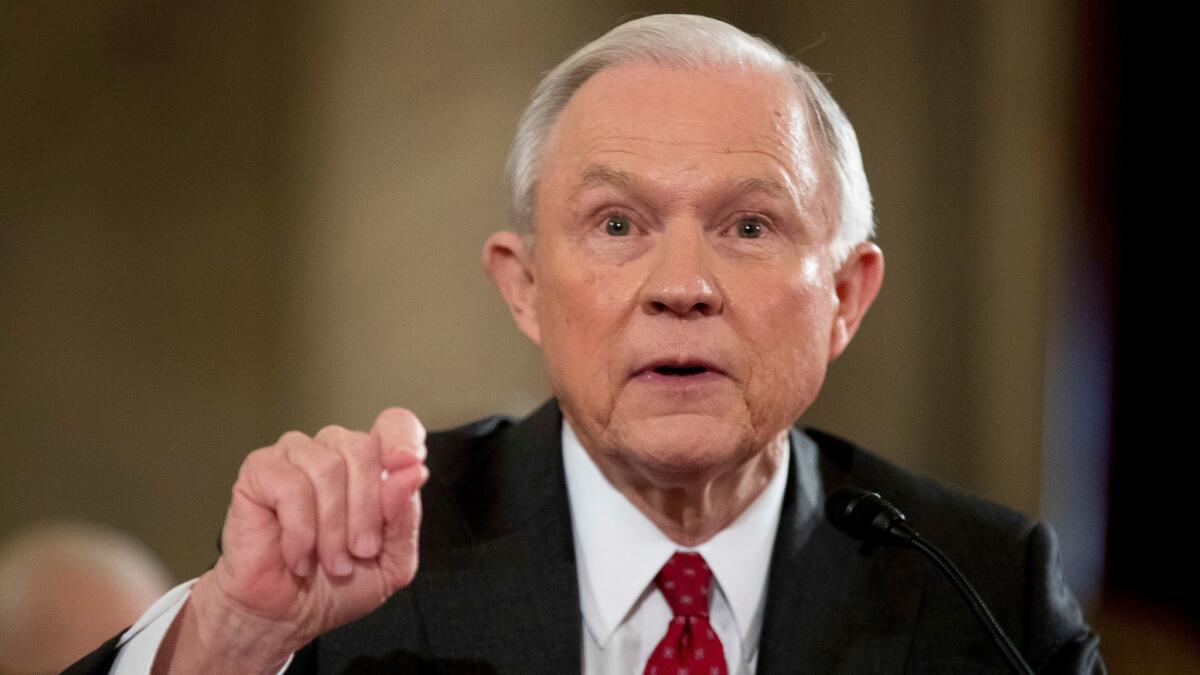Editorial: Jeff Sessions isn’t the attorney general we need

The Senate is expected to vote soon on President Trump’s nomination of Sen. Jeff Sessions of Alabama to be attorney general of the United States. Hard as it may be for lawmakers to vote against one of their own, the Senate should do so in this case. Sessions is the wrong man for the job.
Unlike some of Trump’s Cabinet nominees, Sessions possesses the necessary professional experience for the position to which he has been nominated: He was a longtime U.S. attorney and served as Alabama’s attorney general before being elected to the Senate. We also concede that the president — any president — is entitled to considerable deference from the Senate in staffing the executive branch. It would be unreasonable to expect a Republican president to populate his Cabinet with liberal Democrats.
But Cabinet officers in general and the attorney general in particular aren’t merely executors of a president’s policy. They also are responsible for implementing laws enacted by Congress. In the case of the attorney general, those include laws against discrimination on the basis of race, religion and gender as well as those that punish crimes motivated by hatred of gays and lesbians.
Civil rights groups are virtually unanimous in opposing Sessions’ confirmation because they fear that he won’t vigorously enforce those laws. We share their concern. Our opposition to his nomination is not due to the old charges against him that he made racist comments (charges that led him to be rejected for a federal judgeship in 1986). Those charges are three decades old and, when leveled, generally lead to a he-said-she-said debate about Sessions’ character that is not resolvable.
Civil rights groups are virtually unanimous in opposing Sessions because they fear that he won’t vigorously enforce those laws. We share their concern.
Our concern is about what he’s done in his career and where he stands on the issues. Although he ultimately voted to reauthorize the Voting Rights Act in 2006, Sessions once called that seminal civil rights law “intrusive” and said it was “good news” for the South when the Supreme Court gutted one of its key provisions. He voted against expanding the federal hate-crimes law to include crimes targeting victims because of their sexual orientation. He also voted against legislation requiring interrogators for the CIA and other agencies to abide by restrictions in the Army Field Manual that prohibit inhumane methods of interrogation. (Given that, do we really want him working for a president who has said he believes torture “absolutely” works?)
In his appearance before the Senate Judiciary Committee, Sessions insisted that he would do his “dead level best” to enforce laws that he might not have supported as a legislator. Perhaps he would, but it’s understandable that senators would wonder about the level of enthusiasm he would bring to that task given his past positions.
Moreover, the Department of Justice does more than react to individual cases: When it is most faithful to its mission it also proactively addresses patterns of civil rights violations, as the department over the years has done in pressing urban police departments — including the Los Angeles Police Department and, most recently, the Chicago Police Department — to address patterns and practices that violate civil or constitutional rights.
But Sessions has made it clear that he is skeptical about the department’s use of consent decrees to bring about reforms in police departments. “It’s a difficult thing for a city to be sued by the Department of Justice and to be told that your police department is systemically failing to serve the people of the state or the city,” he told the Judiciary Committee, adding that “we need to be careful and respectful of [police] departments.”
The experience here in Los Angeles suggests, to the contrary, that Justice Department pressure and oversight can be tremendously valuable in reforming troubled police agencies.
Another concern about Sessions is that he would be serving in the administration of a president who already has demonstrated, in his ill-considered executive order blocking the entry of refugees and immigrants from the Middle East, a lack of respect for legal norms. In such an administration, the attorney general must be — and must be seen to be — free of political pressure.
Sessions told the Judiciary Committee that he recognizes that the attorney general “must be willing to tell the president ’no’ if he overreaches.” But Sessions would join the administration as someone who was a fervent political supporter of Trump’s presidential campaign — so fervent that he had to agree to recuse himself from any Justice Department investigation involving Hillary Clinton — and whose former aides are now in key policymaking positions at the White House.
With Donald Trump in the Oval Office, it’s especially important that the attorney general be a figure with a reputation for independence and an unquestioned commitment to the cause of equal justice under law. Sessions falls short of meeting that job description.
Follow the Opinion section on Twitter @latimesopinion and Facebook
More to Read
A cure for the common opinion
Get thought-provoking perspectives with our weekly newsletter.
You may occasionally receive promotional content from the Los Angeles Times.










